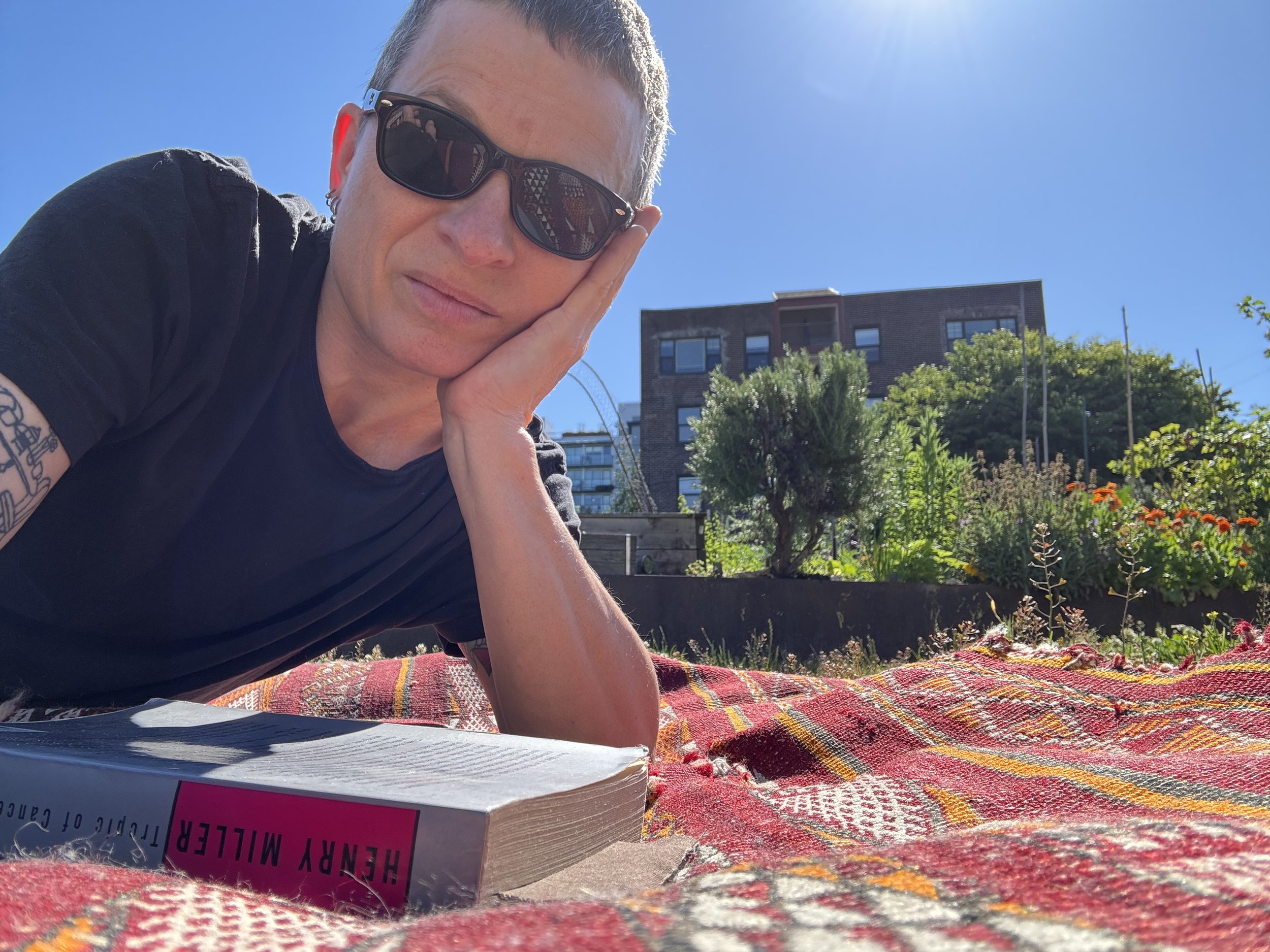Tropic of Cancer by Henry Miller
Still Crazy…
This book became my favorite in the 1990’s because it was seeing a blatant and external source of misogyny that allowed me to begin reconciling the everyday gaslighting I endured.
I first encountered this book by following the mysterious chthonic force of life and plucking the small brick of a paperback randomly off the shelf from Twice Sold Tales in Fremont. This was back when Jamie stewarded several locations of her used bookstores, a retail option that met my twenty-something’s needs for price point, inspiring selection, and feline accompaniment.
Because I was convinced I needed to read The Canon in order to function as an adult, I pored enthusiastically over the vocabulary and syntax like how the author drank Anjou, This is the passage that pierced my ever-emo heart:
“My world of human beings had perished; I was utterly alone in the world and for friends I had the streets, and the streets spoke to me in that sad, bitter language compounded by human misery, yearning, regret, failure, wasted effort. Passing under the viaduct along the Rue Broca, one night after I had been informed that Mona was ill and starving, I suddenly recalled that it was here in the squalor and gloom of this sunken street, terrorized perhaps by a premonition of the future, that Mona clung to me and with a quivering voice begged me to promise that I would never leave her, never, no matter what happened. And only a few days later, I stood on the platform of the Gare St. Lazare and I watched the train pull out, the train that was bearing her away; she was leaning out of the window, just as she had leaned out of the window when I left her in New York, and there was that same sat inscrutable smile on her face, that last-minute look that is intended to convey so much, but is only a mask that is twisted by a vacant smile. …And now it is I standing in the shadow of the viaduct, who reach out for her, who cling to her desperately, and there is that same inexplicable smile on my lips, the mask that I have clamped down over my grief. I can stand here and smile vacantly, and no matter how fervid my prayers, no matter how desperate my longing, there is an ocean between us; there she will stay and starve, and here I shall walk from one street to the next, the hot tears scalding my face.”
Not all of Miller’s expressions are as crystalline or humble. A reader must wade through surrealistic prose while the author stumbles around 1930’s Paris apartments, brothels, and cafes with what sounds like a cohort of drunks, and showing, perhaps, some of the reasons Mona boarded the train.
In one particular pearl, Henry’s friend Van Norden, a self-proclaimed “good guy,” is going on and on:
“The other night I took her on- out of pity- and what do you think the crazy bitch had done to herself? She had shaved it clean…not a speck of hair on it. Did you ever have a woman who shaved her twat? It’s repulsive, ain’t it? And it’s funny, too. Sort of mad like. It doesn't’ look like a twat anymore; it’s like a dead clam or something.”
By the time I read this in the 1990’s, I had already transformed the homegrown misogyny I was raised on into a perfectly cured self-loathing and suspicion of my body. There was that time when my dad and I were crammed underneath a 1977 Ford Granada while I was trying to watch what he was doing. He reached frustratedly past my line of sight towards the oil pan, to reinsert the screw, “Put hair around that hole, I’ll get it in,” he grunted. Also that time when my older, then teenage, brother informed me “Girls’ pussy stinks. It’s like tuna,” I remember he made a face.
Contrary to the assumptions I would be offended by this work (Henry Miller is your favorite author?!), this book became my favorite because it was through seeing a blatant and external source of misogyny that allowed me to begin reconciling the everyday gaslighting I endured. “Women are equal,” they said. That had not been my experience in a female body. This book laid the violence of the patriarchy out like a buffet: vast, all-you-can-eat. My nausea made sense.
I found this book in my hands again on the recent occasion of accompanying my adult child’s surgery/recovery and in need of a particular comfort- something old and familiar. I pulled a book from my son’s shelf, one he put there because he knows my relationship with it. As a strategy of recovery, I haven’t read the literary thoughts of any white man since 2018 (exception: poet David Whyte). This should be good.
Revisiting it, I’m appalled by the ableism, racism, anti-blackness, and misogyny while simultaneously still appreciative of Miller’s raw vulgarity and honesty. He is The Wolf unadorned by Sheep Suit. And despite his indoctrination and toxic embodiment, he also craves a world guided by love. He also is influenced by the strange cocktail of hope and despair. The author’s chagrin with the status quo comes through.
The book concludes:
The sun is setting. I feel this river flowing through me- its past, its ancient solid, the changing climate. The hills gently girdle it about: its course is fixed.
The first wound of that patriarchy, after all, was inflicted on the boys.
